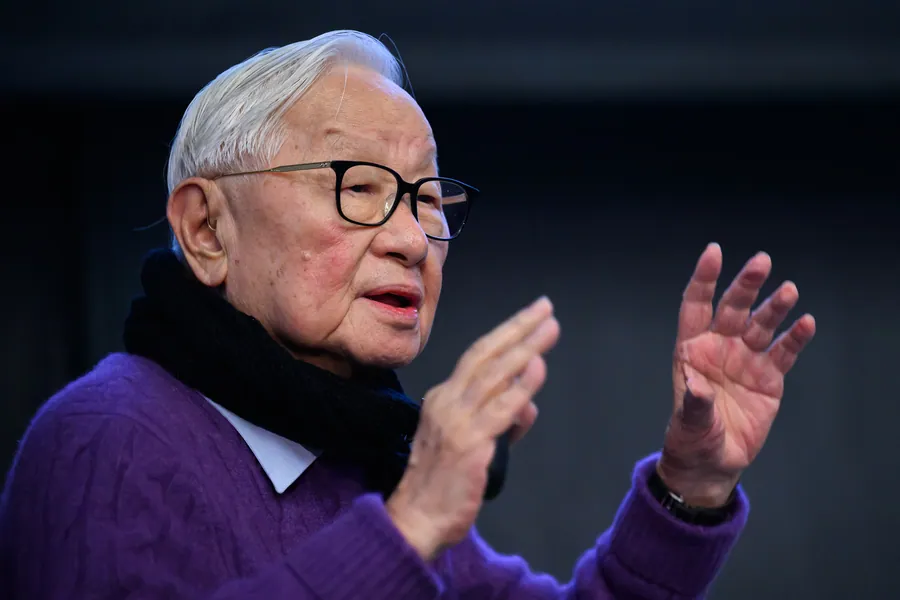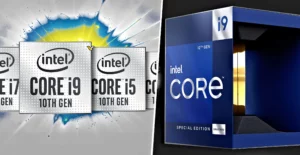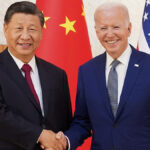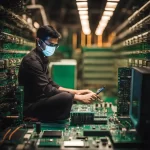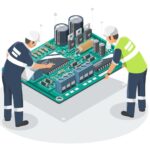Introduction:
Taiwan Semiconductor Manufacturing Company (TSMC) is a name synonymous with innovation and leadership in the semiconductor manufacturing industry and its founder Morris Chang needs no introduction.
TSMC, short for Taiwan Semiconductor Manufacturing Company Limited, commonly known as Taiwan Semiconductor, is a multinational company based in Taiwan. It specializes in contract manufacturing and semiconductor design.
TSMC holds the distinction of being the world’s second most valuable semiconductor company, and it is renowned as the largest dedicated independent semiconductor foundry globally.
Additionally, it stands as the largest corporation in Taiwan, with its primary operations and headquarters situated within the Hsinchu Science Park in Hsinchu, Taiwan.
Notably, the majority of its ownership lies in the hands of foreign investors, while the central government of Taiwan holds the largest stake in the company.
But what are the key elements behind TSMC’s remarkable success?
In a recent talk at MIT, Morris Chang shared his insights on the reasons behind TSMC’s ascent and long-term dominance in semiconductor manufacturing.
Chang delivered his talk, titled “Lessons of a Life in Semiconductor Manufacturing, from Texas to Taiwan,” to a packed audience of over 425 attendees. This presentation was a featured event within the Manufacturing@MIT Distinguished Speaker Series.
1. A Wealth of Talent:
One of the fundamental reasons for TSMC’s success is its access to a steady supply of highly skilled talent.
Chang emphasized the importance of well-trained engineers and technical employees who are willing to work in TSMC.
Taiwan’s trade schools and educational institutions play a pivotal role in producing the skilled technicians needed for semiconductor manufacturing.
As Chang pointed out, these students aspire to build successful careers as technicians, ensuring a continuous inflow of talent into TSMC.
“Because TSMC also gets good, well-trained technicians, and even well-trained operators from a lot of trade schools in Taiwan. … Their students aspire to make a good living as technicians.”
~Morris Chang at MIT
Read More: How China Circumvented US Restrictions to Unveil 120 Layer NAND Flash
2. Low Employee Turnover:
A low turnover of employees is another critical factor contributing to TSMC’s success. This is vital in an industry where experience and expertise are invaluable.
The stability of the workforce at TSMC allows for the accumulation of knowledge and expertise, which leads to improved manufacturing processes and, ultimately, cost savings.
Read More: Why is Foxconn, a Taiwan-based iPhone-maker being investigated by China
3. Geographical Concentration:
Taiwan’s geographical concentration of semiconductor manufacturing is a unique advantage. Having most of the production processes in one place fosters connectivity and collaboration among workers, which, in turn, enhances the learning and experience curve.
As Morris Chang noted, the learning curve and experience curve are most effective when production is centered in a common location. This concentration of resources and expertise has contributed significantly to TSMC’s rise.
“It works, the learning curve, the experience curve, it works only when you have a common location. Learning is local.”
~Morris Chang at MIT
Read More: China Restricts Exports of Graphite, in response to US Ban
4. The Experience Curve Theory:
Chang mentioned the “experience curve theory” as a driving force behind TSMC’s success.
The Experience Curve Theory, also known as the Learning Curve Theory, is an economic concept that suggests that as a company or industry gains experience in producing a particular product or providing a specific service, the costs associated with that production or service tend to decrease over time.
In other words, the more a company or industry produces, the more efficient and cost-effective they become. This theory posits that accumulated manufacturing experience leads to lower production costs.
TSMC’s continuous commitment to refining and improving its manufacturing processes has allowed it to reduce costs and maintain a competitive edge in the industry.
Read More: What are the Key Regulatory Changes by US in the Expanded Ban to China?
5. Economic Development and Adaptation:
TSMC’s success is also closely related to the economic development of Taiwan.
As Taiwan progressed, so did its semiconductor industry.
Chang noted that a nation’s strength in semiconductor manufacturing is closely tied to its economic growth.
He drew parallels between Taiwan’s current advantages and the situation in the U.S. during the 1950s and 1960s.
Chang also hinted that in the future, countries such as India, Vietnam, or Indonesia could see a resurgence in semiconductor activity based on changing conditions.
Read More: Qualcomm Challenges Intel’s Dominance in Desktop CPU Market
Conclusion:
TSMC’s evolution from a startup in 1987 to the world’s leading semiconductor manufacturer underscores the influence of talent, stability, geographic concentration, and unwavering commitment to progress.
Their emphasis on manufacturing excellence and the availability of skilled technicians and engineers has catapulted them to industry prominence.
In alignment with Morris Chang’s remarks at MIT, TSMC’s success results from a blend of factors.
“Without national security, we will lose everything, everything that we value. By all means, let’s avoid even a Cold War, if we can.
~Morris Chang on US-China-Taiwan Relationship
In a rapidly evolving industry, TSMC’s story serves as an inspiration for those looking to build and sustain success in the semiconductor manufacturing sector, and it highlights the importance of nurturing talent and fostering a culture of continuous improvement in any technological enterprise.

